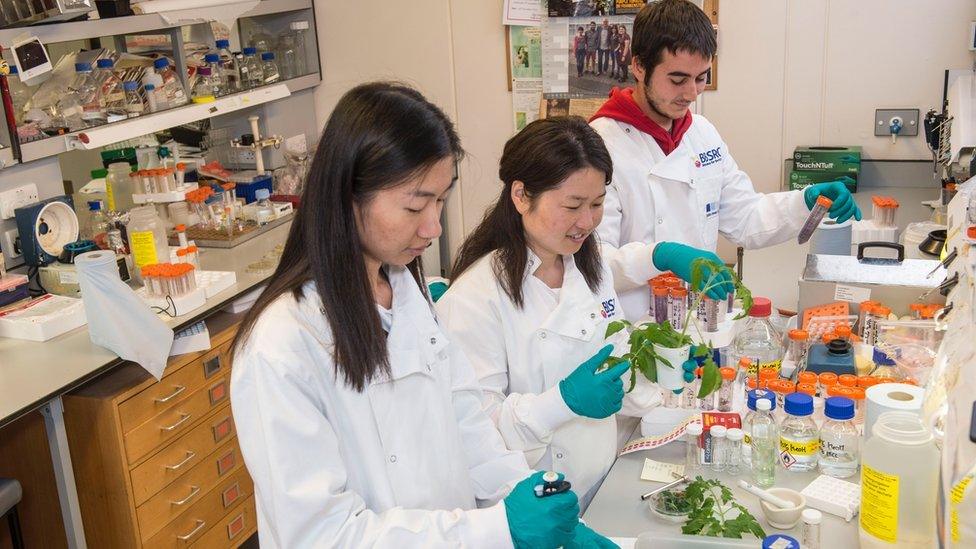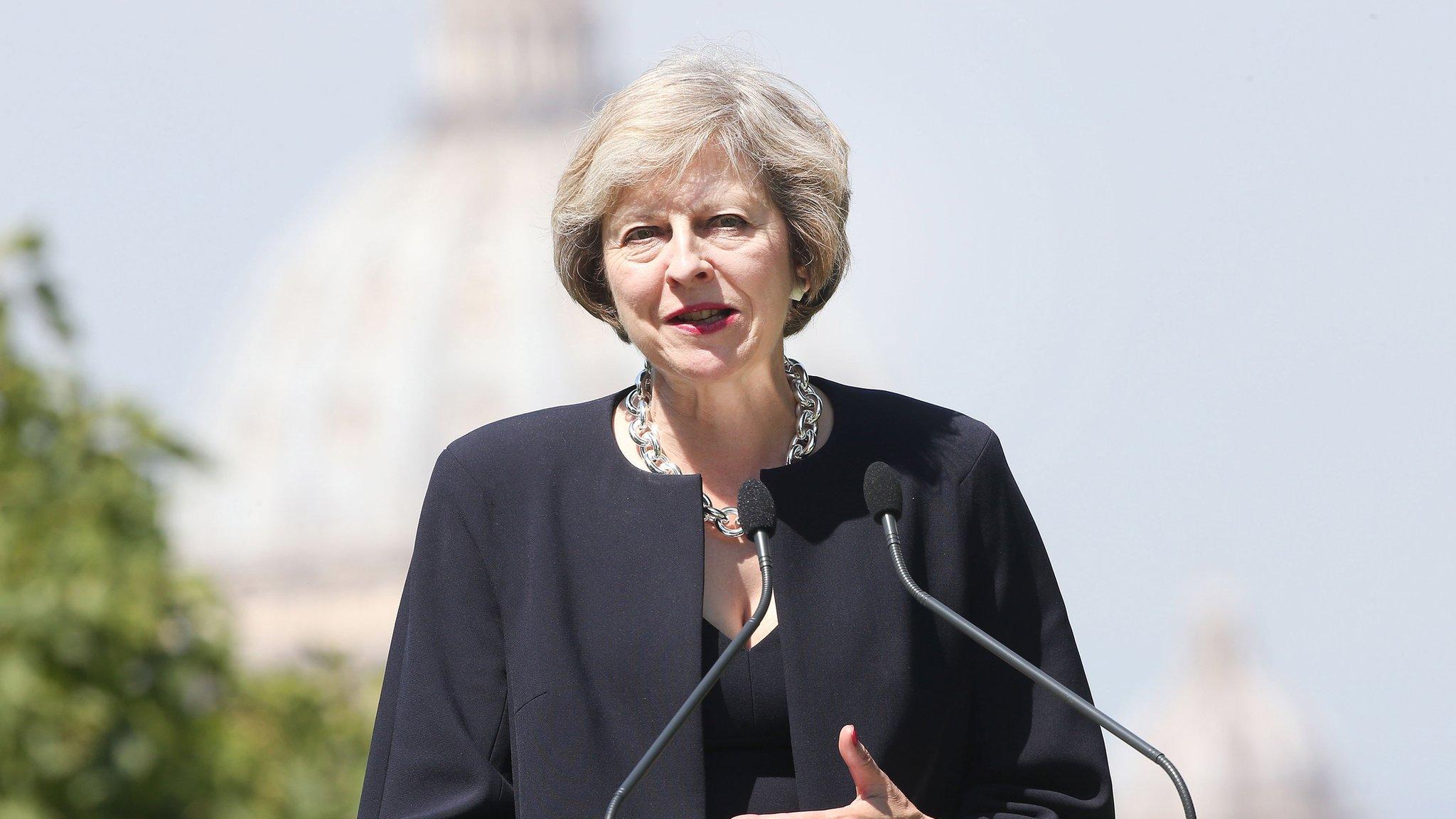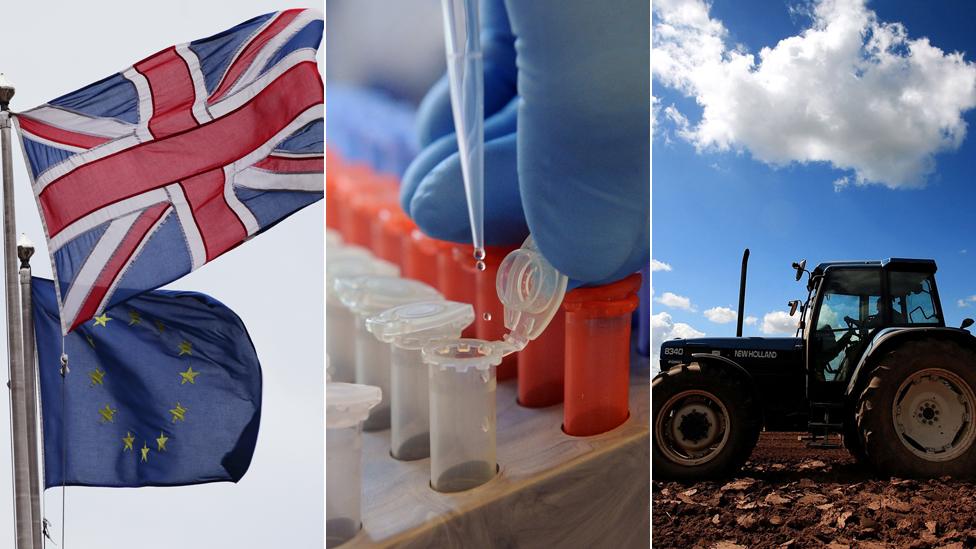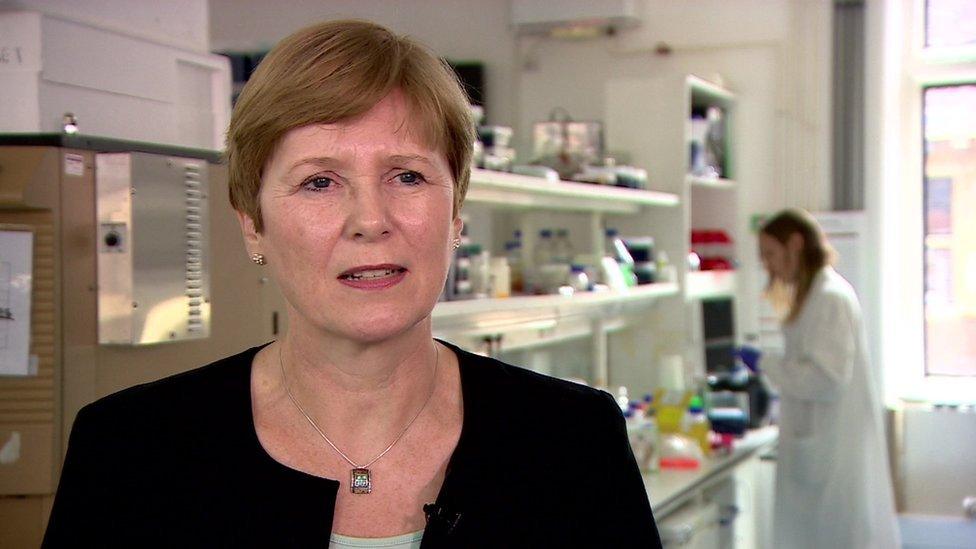Is this the PM's 'white heat' of technology moment?
- Published

In 1963, Harold Wilson gave a speech at the Labour Party Conference, telling his audience that if the country was to prosper, a "new Britain" would need to be forged in the "white heat" of a scientific revolution.
It was one of the most memorable speeches in British politics.
With Theresa May now pledging, at the CBI conference, a big increase in funding for scientific research and development, is this another "white heat of technology" moment?
The scientific community is one of the main beneficiaries of the UK's membership of the EU, and stands to lose out in a post-Brexit world.
Britain receives £850m in research funds from the EU each year. Full membership of one of the main EU funding programmes requires free movement of labour. British universities employ 30,000 scientists with EU citizenship.
There have already been reports of UK scientists losing out in EU grant applications and of EU citizens not taking up posts in UK universities because of the uncertainty around funding and the residency status of EU citizens following the referendum result in June.
If Theresa May's CBI announcement of £2bn for research is truly new money and depending on the strings attached - this intervention could go a long way to cancelling out any potential financial cost of Brexit. It would not on its own, however, make up for the possible loss of collaborations with EU scientists following Brexit.
Within days of becoming Prime Minister, Mrs May wrote to senior scientists to say that she wanted to ensure a positive outcome for science in negotiations to leave the European Union.
A few weeks later, the Chancellor, Phillip Hammond, said that the government would underwrite EU research funds obtained before the UK leaves the EU.
So there is not much more the government could have done to reassure the scientific community in the early days following the referendum result.
Greatest strengths
Now, research leaders want the warm words of the summer turned into firm commitments as the autumn chill of an uncertain future sets in. On the face of it they seem to have precisely that.
The President of the Royal Society, Venki Ramakrishnan, cautiously welcomed the government's announcement of the additional money for research.
He said: "Science and innovation are among the UK's greatest strengths and are key to our future. By placing them at the heart of our industrial strategy the prime minister is setting out a progressive vision for a country where the fruits of knowledge can spur economic growth and improve people's lives. We look forward to seeing further details of the government's plans."
But the scientific community's concern is not just about the money. Free movement of labour enables UK institutions to attract the best scientists from Europe. And the EU research funding system - which requires full members to allow free movement - enables collaborations with researchers from some of the leading labs in Europe.
The prime minster said on Monday that she was committed to attracting the brightest and best researchers to the UK, but this could not be done without reducing overall numbers of people migrating to the UK - an indication that she may be willing to allow some form of free movement of scientific labour or possibly a simplified visa system for researchers.
UK research is among the best in the world. Without the free movement of European scientists, the concern is that this great national resource, which enriches the country and benefits the economy, will slowly be diminished just as other nations are boosting their research efforts.

Chinese scientists are working with researchers in Norwich to assess the medicinal properties of plants as part of a new push to develop research collaborations
At a recent meeting of the Foundation for Science and Technology at the Royal Society, senior scientific leaders were advised against complaining too much.
The former science minister, Lord Willetts, was not quite that blunt as he tactfully told them that unless they were seen to adopt a more constructive approach they would be in danger of being regarded as a privileged elite, putting their own self-serving interest ahead of the wishes of many people in the country.
Smart lobbying
He gently urged them to be as smart with their lobbying as they are with their research and to play the government's game. As a first step, he said, the science community should make every effort to set up new collaborations with research groups outside Europe.
One of the government's top political priorities is to demonstrate that the country can thrive post-Brexit, so there is plenty of money and enthusiasm from ministers for projects with institutions in the US, China and Commonwealth countries.
Lord Willetts suggested that if researchers try their best to seize the new opportunities Brexit presents, two things might happen. First, they might be pleasantly surprised and get to be involved in some really good, well-funded science. Second, according to the wily Lord Willetts, they would receive a more sympathetic hearing from government for the concessions they are seeking over Brexit.
Chief among these is an exemption for researchers from restrictions on free movement - both from the EU and from other parts of the world. If the research leaders cannot get free movement for scientists then they will seek a simpler, faster and less bureaucratic visa system for them. And the university sector wants to take student numbers out of the immigration figures - because if foreign student numbers are cut, British universities receive less money.
But any relaxation on immigration would be at odds with the government's stated aim of reducing numbers.
One chink of hope for many in the scientific community is that the government's much heralded industrial strategy might come to their rescue. No-one knows quite what the strategy is - so at the moment it is whatever anyone wants it to be.

Scientists are advised to seek more research collaborations outside the EU, such as its leading role with the Square Kilometre Array - which will deploy huge fields of antennas across Africa and Australia
Scientific leaders want it to be something that provides the political cover for government to be more flexible on immigration and a means by which they can get a huge cash injection.
A vibrant research base, they are telling ministers, could be the engine to the high-tech, high-skills economy that Mrs May has said she wants post-Brexit Britain to be. It would also present the optimistic narrative the government is seeking.
More money
So emboldened by the possibility of research being at the heart of the industrial strategy, four of the UK's national science academies and the Campaign for Science and Engineering (Case) have called for the government and UK industry to make up for the possible loss of EU funding.
They also asked them to nearly double the amount of public and private money spent on research. The academies and Case want an increase from the current 1.7% of GDP to 3% by 2025. This would bring British R&D spending in line with Germany and increase the UK's annual combined public and private research spending from around £30.6bn to £52bn.
Such a boost in funding would be transformative, according to Naomi Weir of Case.
"It would boost confidence for inward investment, drive growth in the economy, see the creation of high-quality jobs and increase our capacity to tackle national and global challenges in health, energy and the environment," she said.
Follow Pallab on Twitter, external
- Published28 July 2016

- Published13 August 2016

- Published19 July 2016
